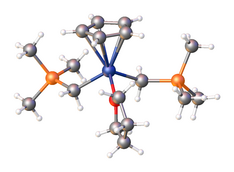
Summary
Organoscandium chemistry is an area with organometallic compounds focused on compounds with at least one carbon to scandium chemical bond.[2][3] The interest in organoscandium compounds is mostly academic but motivated by potential practical applications in catalysis, especially in polymerization. A common precursor is scandium chloride, especially its THF complex.[4]

As with the other elements in group 3 – e.g. yttrium, forming organoyttrium compounds – and the lanthanides, the dominant oxidation state for scandium in organometallic compounds is +3 (electron configuration [Ar] 3d14s2). The members of this group also have large ionic radii with vacant s,p and d orbitals (88 pm for Sc3+ compared to 67 pm for Al3+) and as a result they behave as hard Lewis acids and tend to have high coordination numbers of 9 to 12. The metal to ligand chemical bond is largely ionic.
Illustrative complexes edit
Sc(III) derivatives edit
Many organoscandium(III) compounds have at least one cyclopentadienyl-type ligand. The reaction of scandium trichloride with two equivalents of sodium cyclopentadienide (NaCp) produces the chloride-bridged dimer:
- 2 ScCl3 + 4 NaCp → [Cp2Sc(μ-Cl)]2 + 4 NaCl
Cp3Sc is a polymer wherein one third of the Cp ligands serving as bridging ligands.[5]
Bulkier cyclopentadienide ligands give monoscandium derivatives, e.g. (C5Me5)2ScCl.[6] The corresponding alkyls polymerize alkenes.[7] [8]
The synthesis of a tris(allyl)scandium complex is analogous to the above methods, involving the reaction of ScCl3 with allyl potassium in THF solution, The product is Sc(C3H5)3(THF)2 wherein two allyl ligands are η3 coordinated and one allyl ligand is η1.[9]
Sc(II) and Sc(I) derivatives edit
Organoscandium compounds in lower oxidation states have been prepared.[10][11]
References edit
- ^ Li, Xiaofang; Nishiura, Masayoshi; Hu, Lihong; Mori, Kyouichi; Hou, Zhaomin (2009). "Alternating and Random Copolymerization of Isoprene and Ethylene Catalyzed by Cationic Half-Sandwich Scandium Alkyls". Journal of the American Chemical Society. 131 (38): 13870–13882. doi:10.1021/ja9056213. PMID 19728718.
- ^ Synthesis of Organometallic Compounds: A Practical Guide Sanshiro Komiya Ed. 1997
- ^ C. Elschenbroich, A. Salzer Organometallics : A Concise Introduction (2nd Ed) (1992) from Wiley-VCH: Weinheim. ISBN 3-527-28165-7
- ^ Manzer, L. E. (1982). Tetrahydrofuran Complexes of Selected Early Transition Metals. Inorganic Syntheses. Vol. 21. pp. 135–140. doi:10.1002/9780470132524.ch31.
- ^ Atwood, Jerry L.; Smith, Karl D. (1973). "Crystal Structure of di-µ-chloro-bis[di-η-cyclopentadienylscandium(III)]". J. Chem. Soc., Dalton Trans. (22): 2487–2490. doi:10.1039/DT9730002487.
- ^ Huynh, Winn; Culver, Damien B.; Tafazolian, Hosein; Conley, Matthew P. (2018). "Solid-state 45Sc NMR Studies of Cp*2Sc–X and Cp*2ScX(THF)". Dalton Transactions. 47 (37): 13063–13071. doi:10.1039/C8DT02623H. PMID 30160275.
- ^ Thompson, Mark E.; Baxter, Steven M.; Bulls, A. Ray; Burger, Barbara J.; Nolan, Michael C.; Santarsiero, Bernard D.; Schaefer, William P.; Bercaw, John E. (1987). "σ-Bond Metathesis for Carbon-Hydrogen Bonds of Hydrocarbons and Sc-R (R = H, alkyl, aryl) Bonds of Permethylscandocene Derivatives. Evidence for Noninvolvement of the π System in Electrophilic Activation of Aromatic and Vinylic C-H Bonds". Journal of the American Chemical Society. 109: 203–219. doi:10.1021/ja00235a031.
- ^ Bouwkamp, Marco W.; Budzelaar, Peter H. M.; Gercama, Jeroen; Del Hierro Morales, Isabel; De Wolf, Jeanette; Meetsma, Auke; Troyanov, Sergei I.; Teuben, Jan H.; Hessen, Bart (2005). "Naked (C5Me5)2M Cations (M = Sc, Ti, and V) and Their Fluoroarene Complexes" (PDF). Journal of the American Chemical Society. 127 (41): 14310–14319. doi:10.1021/ja054544i. PMID 16218625.
- ^ Standfuss, Sabine; Abinet, Elise; Spaniol, Thomas P.; Okuda, Jun (2011). "Allyl Complexes of Scandium: Synthesis and Structure of Neutral, Cationic and Anionic Derivatives". Chemical Communications. 47 (41): 11441–11443. doi:10.1039/C1CC14180E. PMID 21946865.
- ^ Polly L. Arnold; F. Geoffrey; N. Cloke; Peter B. Hitchcock & John F. Nixon (1996). "The First Example of a Formal Scandium(I) Complex: Synthesis and Molecular Structure of a 22-Electron Scandium Triple Decker Incorporating the Novel 1,3,5-Triphosphabenzene Ring". J. Am. Chem. Soc. 118 (32): 7630–7631. doi:10.1021/ja961253o.
- ^ Ana Mirela Neculai; Dante Neculai; Herbert W. Roesky; Jörg Magull; Marc Baldus; et al. (2002). "Stabilization of a Diamagnetic ScIBr Molecule in a Sandwich-Like Structure". Organometallics. 21 (13): 2590–2592. doi:10.1021/om020090b.


